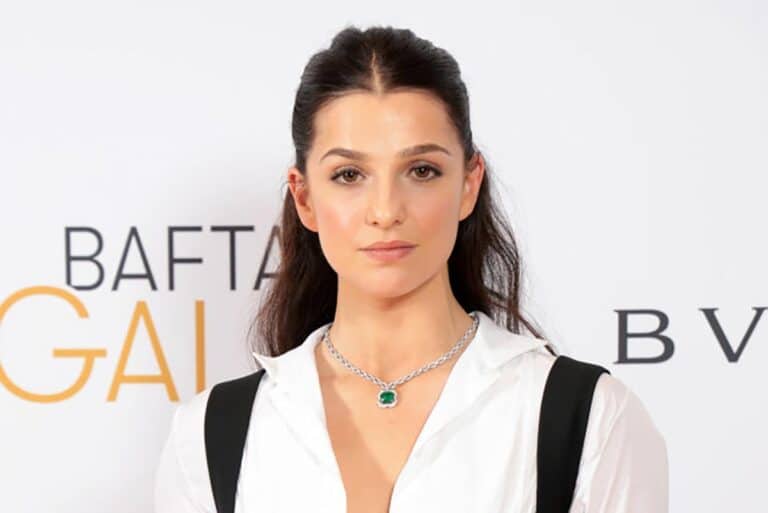
When it was first announced that Jewish actress Marisa Abela would play Amy Winehouse in “Back to Black” — a biopic chronicling the life and music of the iconic singer — there was a general buzz of excitement within the Jewish community.
Abela’s Jewish identity has been a focal point of the conversation surrounding “Back to Black,” and is more broadly a part of conversations about whether non-Jewish actors should portray Jewish characters on screen.
The film’s creative team stated that casting a Jewish actress to play Winehouse was crucial to authentically represent the singer’s background, as reported by British Vogue. Read more about Amy Winehouse’s Jewish identity.
Abela — who rose to fame after her lead role in the series “Industry” produced by Lena Dunham — is the spitting image of Winehouse in the latest trailer.
Featuring Winehouse’s signature beehive, gold hoops and tattoos, Abela also wears a big gold Star of David necklace nearly identical to the one worn by Winehouse.
In recent interviews, Abela revealed that one of the ways she initially connected with Winehouse’s essence was through their shared Jewish identity.
Ahead of the movie’s release next month in the United Kingdom and in May in the United States, we scraped the internet for everything we could find about Abela’s Jewish identity.
The basics
Marisa Abela was born on Dec. 7, 1996, in Brighton, England, to actress Caroline Gruber and director Angelo Abela.
Her father is of Maltese Libyan descent, and her mother is Ashkenazi Jewish.
“I am someone whose mum and dad come from completely different cultures,” Abela said about her background in an interview. “My dad is Maltese Arab, and my mum is from a family of Polish Jewish refugees.”
She grew up in a small Jewish community
Abela’s parents split when she was young and she was raised by her mother, Caroline, in the coastal British city of Brighton.
Brighton is about an hour-long train ride from London and has an estimated Jewish population of under 3,000 people. The city is currently working on efforts to “revitalize” its Jewish community.
Her mom has played Jewish characters on screen too
Abela’s mother Caroline Gruber is primarily a theater actress, starring in shows like National Theatre Live’s 2022 “Leopoldstadt.”
“I grew up in auditoriums and theaters and lighting boxes, watching show after show with the cast and crew,” Abela said of her upbringing. “I kind of grew up in the theater as opposed to on set.”
Gruber has also portrayed some Jewish characters on screen.
She played the role of Mrs. Hannah Shapiro in the Jewish drama “Disobedience,” which stars Rachel Weisz and Rachel McAdams in a Hasidic Jewish community.
Before that, she played one of the main characters in “Heil Honey I’m Home,” a satirical British sitcom depicting Adolf Hitler and Eva Braun living next door to a Jewish couple, Arny and Rosa Goldenstein (played by Gruber). The show was controversial and was canceled after one episode.
Abela’s Jewish identity inspired her portrayal of Winehouse
Abela admitted in an interview with Harper’s Bazaar that she initially felt hesitant to play Winehouse in “Back to Black.” However, she gained confidence in the role once she started relating to her on a Jewish level.
“The more I got to know her, the more I felt a major connection to this spiky Jewish girl from London who had a lot to say, and was really quite unafraid,” she said. “I understood what a Friday-night dinner would look like in her home, the humor in her family.”
This cultural connection was Abela’s starting point for getting into Winehouse’s character.
“Once I framed her in that way, I felt I was in a position to take on this role,” she said.
She has memories of being inspired by Winehouse’s Jewish pride
Long before playing Amy Winehouse, Abela recalls being inspired by seeing Winehouse as a cool, proud Jewish woman.
“I remembered how I felt when I was young, seeing that woman who was proud and cool, wearing a big Star of David in between a cleavage and a nice bra,” she said in an interview.
“I loved how effervescent she was, how huge a soul, how she just permeated any room she was in. But also, her relationship to her art form, and wanting to be good. That was the most important thing.”
Read more: Everything we know about Amy Winehouse’s Jewish identity


